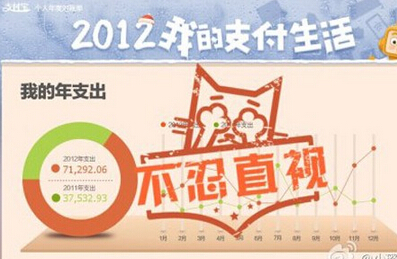You spend lots of time and money shopping online during the past year and somehow you lost track of both.
去年,你将大把的时间和金钱都花在了网购上,但却从未留意过这两项的付出。
That’s why when you received you annual statement from Alipay, the Chinese third-party online payment platform, you probably got a nasty surprise.
这就是为何当你收到第三方支付平台“支付宝”的年度账单时,会感到有惊无喜的原因了。
The annual statement, which shows consumers’ personal spending and online payment patterns, caused a stir when it was released by Alipay on Jan 15. Many micro-bloggers shared how much money they spend shopping online, mostly on Taobao, and how they felt after discovering the extent of their consumption. As you may have guessed, most of them were shocked by their statement.
支付宝于1月15日发布了个人年度账单,列出了用户的个人开销以及在线支付方式,这随即引起轰动。微博上人们(其中大部分为“淘宝控”)纷纷晒出网购账单以及看到自己消费额后的感想。正如你所料,多数人都被自己的账单雷到了。

Chen Si, 23, a senior in Literature of Film and TV at Shandong University of Arts, put a stamp “Can’t bear to look at it” on her statement.
山东艺术学院戏剧影视文学专业大四学生、23岁的陈思(音译)在自己的账单上打上了“无法直视”的标签。
“Many micro-bloggers said they would rather ‘cut their hands off’ after seeing how every cent of their money was spent online shopping last year. I’m one of them,” Chen said.
陈思坦言:“许多博主表示在看到自己去年的网购账单时都恨不得‘剁手’,我也是其中之一。”
Last year, Chen spent about 10,000 yuan on Taobao — more than 60 percent of online shoppers in the city of Jinan and more than half of her living expenses. Chen, who didn’t buy any expensive items online, had no idea where her money went before seeing the statement, which labeled her as “an upstart of online shopping”.
去年,陈思的淘宝账单约为1万元人民币,超过济南市60%的网购用户,占她日常开销的一多半。并未网购过什么昂贵商品的陈思在看到自己的账单之前根本不知道钱都花到哪里去了,而她也被贴上了“网购新贵”的标签。
“My attitude to consumption was summarized as ‘economical’, ‘practical’ and ‘home-loving’,” Chen said. “It makes sense because I bought lots of things on discount days such as Nov 11 and Dec 12, and I purchased many home products.”
“我的消费态度被总结成‘经济’、‘实用’、‘爱家’,”陈思说,“这点倒是说得通,因为我在‘双十一’和‘双十二’这种折扣日血拼了很多东西,而且我买了好多家居用品。”
While many like Chen regret their excessive spending, some are making a big deal out of how little they spent. Zhu Siwei, 25, an accountant from Jinhua, Zhejiang province, spent a total of 489 yuan last year, according to her Alipay statement. Since she posted her consumption status on Sina Weibo she’s been asked by many fellow micro-bloggers how to save money.
当许多人同陈思一样为自己的过度消费而后悔不已时,也有人因为花钱少而受到网友追捧。根据一张支付宝账单显示,来自浙江金华25岁的会计朱思微(音译)去年只花了489元。她的账单在新浪微博上一经晒出,网友纷纷向她讨教省钱妙方。
“If you subtract the 38.7 yuan transfer fee, my actual expenditure in 2012 was 450.3 yuan,” Zhu said. “I usually get tied up with work and don’t have that much time for online shopping. I spend most of my money on my personal interests, such as reading books and listening to CDs.”
“如果扣掉38.7元的转账费用的话,2012年我的实际支出只有450.3元。”朱思微说,“我平时忙于工作,没什么时间网购。我的钱主要花在了一些个人爱好上,比如买书和CD。”
Whether the numbers are surprisingly high or low, Alipay’s annual statement is more than just analysis of users’ different consumption patterns.
不管账单上令人大跌眼镜的数字是高是低,支付宝年度账单不仅仅是对用户消费方式的简单分析。
As Ma Yun, the CEO of Alibaba.com, an online shopping website, once said: “E-commerce is not a business mode or technology, but a way of life.”
正如阿里巴巴CEO马云所说:“电商不是商业模式和技术,而是生活方式。”
An annual statement reflects a person’s consumption habits and lifestyle. But it’s also a warning that, while online shopping provides us with convenience and a refreshing way of living, we should be cautious about our consumption, especially when it comes to online shopping where money is just a number.
年度账单反映出一个人的消费习惯和生活方式,但这同样也是种警告:在网购为我们带来便利与新鲜生活方式的同时,我们也要谨慎消费,尤其是在网购时,因为在网上,金钱只是个数字。


